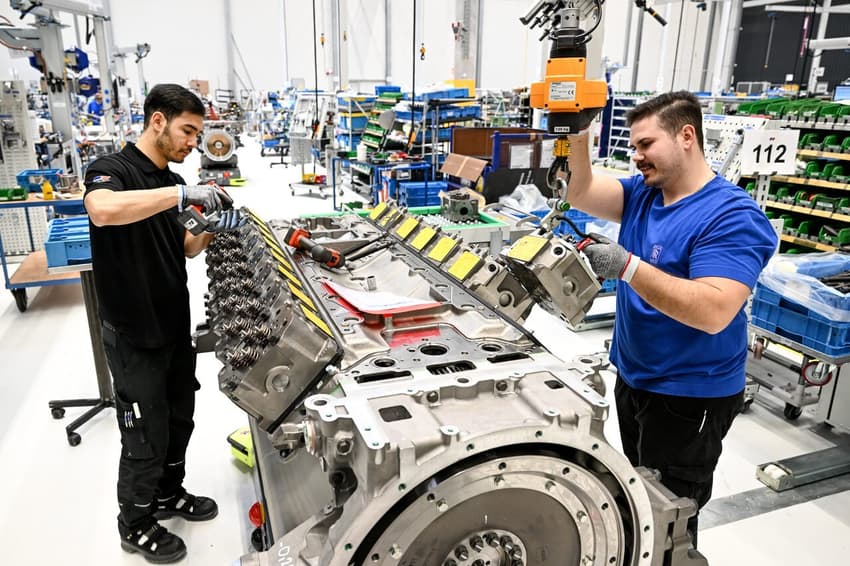Why do some foreign workers in Germany ultimately choose to leave?

Tens of thousands of foreign workers come to Germany each year - and a new laws aims to attract even more to plug the country's labour shortage. Why do many decide, however, not to stay for long?
Raymund Guevara worked as a nurse in a hospital in Lower Saxony for five years. But since January, the 37-year-old Filipino has been living with his wife in the US state of Florida.
"We wanted to fulfill our dream," he told German news agency DPA by phone.
Buying a house was very difficult in Germany, largely because of the higher interest loans.
In Florida, he receives state support as a caregiver. Getting a driving licence or a residence permit is also more complicated in Germany, as is the language, he said.
"In the USA, we have more possibilities and it is more comfortable."
Nurses like Guevara are desperately sought after in Germany. But they are not the only ones: according to an analysis by the Federal Employment Agency, there is a shortage of skilled workers in every sixth profession.
This is where the reform of the Skilled Labour Immigration Act within Germany's coalition government comes in.
The new law, expected to come into force next March, is intended to dismantle bureaucratic barriers for skilled workers from abroad and create incentives for them to come to Germany.
READ ALSO: EXCLUSIVE: Germany's new skilled worker law to come into force 'in March 2024'
But they not only have to come, they also have to want to stay - at least for a while.
Temporary migration
Mobility is increasing due to cheap means of transport and communication technology, said Herbert Brücker of the Institute for Employment Research in Nuremberg.
"Temporary migration is on the rise."
Guevara is a prime example of this. He came to Germany in 2018, and just five years later, he and his wife had no qualms about leaving everything behind and starting a new life in Florida.
But how do you get people to stay? The answer could lie in the reasons people give for leaving.
That, at least, is what the Federal Employment Agency is hoping. The government agency recently commissioned the Tübingen Institute for Applied Economic Research to conduct a survey of almost 1,900 people via Facebook to find out why they were planning to emigrate.
They found that many workers from abroad turn their backs on Germany primarily for residence and professional reasons, such as the end of temporary employment or because their professional qualifications were not recognised.
"But it also has to do with life here," said study director Bernhard Boockmann.
For example, two out of three highly qualified professionals from non-EU countries said they had experienced discrimination because of their ethnicity or country of origin.
"From my point of view, this is to be taken quite seriously," said Boockmann. "Every single reason can be the one that breaks the camel's back."
The fact that foreign workers do not always feel welcome can also be confirmed by the Hamburg business psychologist Grace Lugert-Jose.
She was born in the Philippines and has lived in Germany for more than 20 years.

A man works in a factory in Dresden. Germany is desperate for skilled workers in manufacturing and elsewhere. Photo: picture alliance/dpa | Sebastian Kahnert
She uses her own experience to advise hospitals and care facilities on the integration of international professionals.
Last year, she asked more than 100 Filipino care workers via social media how satisfied they were with their jobs. According to her, many said they felt unappreciated and lacked recognition of their professional qualifications.
Without being asked, about one fifth also reported having experienced discrimination and racism, said Lugert-Jose. "For example, insults and condescending behaviour because they don't speak German so perfectly yet."
But cultural differences also often cause misunderstandings, which Lugert-Jose says employers are increasingly aware of.
Loneliness among new arrivals
Integration officers and intercultural training are supposed to help new workers settle in and sensitise old and new employees to potential cultural differences.
Alexander Kritikos of the German Institute for Economic Research (DIW) in Berlin confirmed that some companies are already doing a lot in this respect. Nevertheless, all companies must be prepared to invest more, he said.
"It starts with trivial things like organising car pooling. That can break the ice."
READ ALSO: 'Being honest helps': How expats have overcome loneliness in Germany
That alone is not enough, according to economics professor Jutta Rump from the University of Applied Sciences in Ludwigshafen. "Nonetheless, at Christmas or birthdays, you are still alone again."
"Loneliness and homesickness play a big role."
The overall living conditions in Germany are crucial not just for bringing in, but also retaining, workers says Brücker.
"Bottlenecks in childcare affect everyone, but migrants more. And are our schools inclusive enough to give migrant children equal opportunities?"
Social construction in urban centres also needs to be strengthened, he added. If migrants pay a lot for housing, "the wage advantage compared to other countries is frittered away."
"You have to think about migration in everything you do," said Brücker.
All this cannot be changed in a hurry and can only help to ensure that foreign workers stay here for the long term or permanently.
Ultimately, Brücker points out, there are very individual reasons why someone leaves, be it a a different life plan, disappointed expectations or insufficient earnings.
"It is important to give people the opportunity and the feeling that they can come back if there are suitable jobs for them in Germany," says DIW expert Kritikos.
In Raymund Guevara's case, at least, that is not out of the question.
"Germany is a wonderful country," he said. "And we miss our friends. Maybe we'll come back someday when we've saved enough money."
Comments (1)
See Also
Raymund Guevara worked as a nurse in a hospital in Lower Saxony for five years. But since January, the 37-year-old Filipino has been living with his wife in the US state of Florida.
"We wanted to fulfill our dream," he told German news agency DPA by phone.
Buying a house was very difficult in Germany, largely because of the higher interest loans.
In Florida, he receives state support as a caregiver. Getting a driving licence or a residence permit is also more complicated in Germany, as is the language, he said.
"In the USA, we have more possibilities and it is more comfortable."
Nurses like Guevara are desperately sought after in Germany. But they are not the only ones: according to an analysis by the Federal Employment Agency, there is a shortage of skilled workers in every sixth profession.
This is where the reform of the Skilled Labour Immigration Act within Germany's coalition government comes in.
The new law, expected to come into force next March, is intended to dismantle bureaucratic barriers for skilled workers from abroad and create incentives for them to come to Germany.
READ ALSO: EXCLUSIVE: Germany's new skilled worker law to come into force 'in March 2024'
But they not only have to come, they also have to want to stay - at least for a while.
Temporary migration
Mobility is increasing due to cheap means of transport and communication technology, said Herbert Brücker of the Institute for Employment Research in Nuremberg.
"Temporary migration is on the rise."
Guevara is a prime example of this. He came to Germany in 2018, and just five years later, he and his wife had no qualms about leaving everything behind and starting a new life in Florida.
But how do you get people to stay? The answer could lie in the reasons people give for leaving.
That, at least, is what the Federal Employment Agency is hoping. The government agency recently commissioned the Tübingen Institute for Applied Economic Research to conduct a survey of almost 1,900 people via Facebook to find out why they were planning to emigrate.
They found that many workers from abroad turn their backs on Germany primarily for residence and professional reasons, such as the end of temporary employment or because their professional qualifications were not recognised.
"But it also has to do with life here," said study director Bernhard Boockmann.
For example, two out of three highly qualified professionals from non-EU countries said they had experienced discrimination because of their ethnicity or country of origin.
"From my point of view, this is to be taken quite seriously," said Boockmann. "Every single reason can be the one that breaks the camel's back."
The fact that foreign workers do not always feel welcome can also be confirmed by the Hamburg business psychologist Grace Lugert-Jose.
She was born in the Philippines and has lived in Germany for more than 20 years.

She uses her own experience to advise hospitals and care facilities on the integration of international professionals.
Last year, she asked more than 100 Filipino care workers via social media how satisfied they were with their jobs. According to her, many said they felt unappreciated and lacked recognition of their professional qualifications.
Without being asked, about one fifth also reported having experienced discrimination and racism, said Lugert-Jose. "For example, insults and condescending behaviour because they don't speak German so perfectly yet."
But cultural differences also often cause misunderstandings, which Lugert-Jose says employers are increasingly aware of.
Loneliness among new arrivals
Integration officers and intercultural training are supposed to help new workers settle in and sensitise old and new employees to potential cultural differences.
Alexander Kritikos of the German Institute for Economic Research (DIW) in Berlin confirmed that some companies are already doing a lot in this respect. Nevertheless, all companies must be prepared to invest more, he said.
"It starts with trivial things like organising car pooling. That can break the ice."
READ ALSO: 'Being honest helps': How expats have overcome loneliness in Germany
That alone is not enough, according to economics professor Jutta Rump from the University of Applied Sciences in Ludwigshafen. "Nonetheless, at Christmas or birthdays, you are still alone again."
"Loneliness and homesickness play a big role."
The overall living conditions in Germany are crucial not just for bringing in, but also retaining, workers says Brücker.
"Bottlenecks in childcare affect everyone, but migrants more. And are our schools inclusive enough to give migrant children equal opportunities?"
Social construction in urban centres also needs to be strengthened, he added. If migrants pay a lot for housing, "the wage advantage compared to other countries is frittered away."
"You have to think about migration in everything you do," said Brücker.
All this cannot be changed in a hurry and can only help to ensure that foreign workers stay here for the long term or permanently.
Ultimately, Brücker points out, there are very individual reasons why someone leaves, be it a a different life plan, disappointed expectations or insufficient earnings.
"It is important to give people the opportunity and the feeling that they can come back if there are suitable jobs for them in Germany," says DIW expert Kritikos.
In Raymund Guevara's case, at least, that is not out of the question.
"Germany is a wonderful country," he said. "And we miss our friends. Maybe we'll come back someday when we've saved enough money."
Join the conversation in our comments section below. Share your own views and experience and if you have a question or suggestion for our journalists then email us at [email protected].
Please keep comments civil, constructive and on topic – and make sure to read our terms of use before getting involved.
Please log in here to leave a comment.